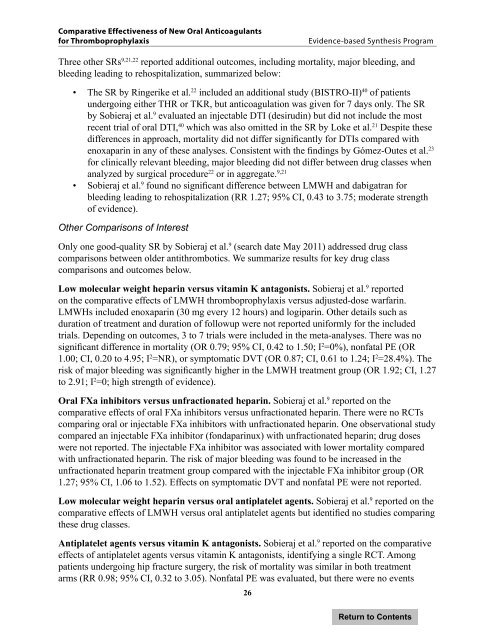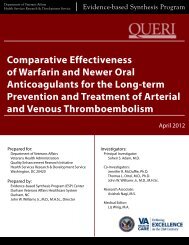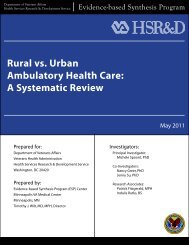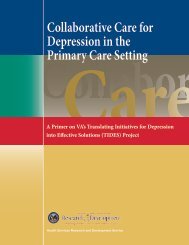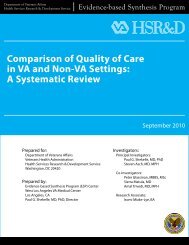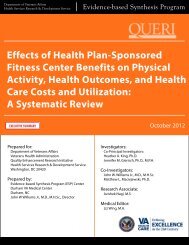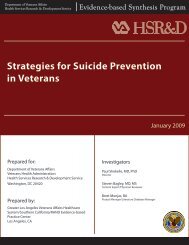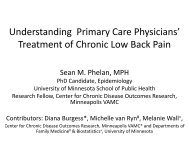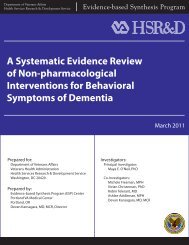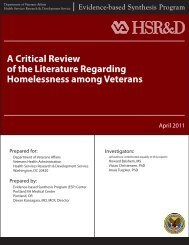Comparative Effectiveness of New Oral Anticoagulants for ...
Comparative Effectiveness of New Oral Anticoagulants for ...
Comparative Effectiveness of New Oral Anticoagulants for ...
Create successful ePaper yourself
Turn your PDF publications into a flip-book with our unique Google optimized e-Paper software.
<strong>Comparative</strong> <strong>Effectiveness</strong> <strong>of</strong> <strong>New</strong> <strong>Oral</strong> <strong>Anticoagulants</strong><br />
<strong>for</strong> Thromboprophylaxis<br />
Evidence-based Synthesis Program<br />
Three other SRs 9,21,22 reported additional outcomes, including mortality, major bleeding, and<br />
bleeding leading to rehospitalization, summarized below:<br />
• The SR by Ringerike et al. 22 included an additional study (BISTRO-II) 40 <strong>of</strong> patients<br />
undergoing either THR or TKR, but anticoagulation was given <strong>for</strong> 7 days only. The SR<br />
by Sobieraj et al. 9 evaluated an injectable DTI (desirudin) but did not include the most<br />
recent trial <strong>of</strong> oral DTI, 40 which was also omitted in the SR by Loke et al. 21 Despite these<br />
differences in approach, mortality did not differ significantly <strong>for</strong> DTIs compared with<br />
enoxaparin in any <strong>of</strong> these analyses. Consistent with the findings by Gómez-Outes et al. 23<br />
<strong>for</strong> clinically relevant bleeding, major bleeding did not differ between drug classes when<br />
analyzed by surgical procedure 22 or in aggregate. 9,21<br />
• Sobieraj et al. 9 found no significant difference between LMWH and dabigatran <strong>for</strong><br />
bleeding leading to rehospitalization (RR 1.27; 95% CI, 0.43 to 3.75; moderate strength<br />
<strong>of</strong> evidence).<br />
Other Comparisons <strong>of</strong> Interest<br />
Only one good-quality SR by Sobieraj et al. 9 (search date May 2011) addressed drug class<br />
comparisons between older antithrombotics. We summarize results <strong>for</strong> key drug class<br />
comparisons and outcomes below.<br />
Low molecular weight heparin versus vitamin K antagonists. Sobieraj et al. 9 reported<br />
on the comparative effects <strong>of</strong> LMWH thromboprophylaxis versus adjusted-dose warfarin.<br />
LMWHs included enoxaparin (30 mg every 12 hours) and logiparin. Other details such as<br />
duration <strong>of</strong> treatment and duration <strong>of</strong> followup were not reported uni<strong>for</strong>mly <strong>for</strong> the included<br />
trials. Depending on outcomes, 3 to 7 trials were included in the meta-analyses. There was no<br />
significant difference in mortality (OR 0.79; 95% CI, 0.42 to 1.50; I 2 =0%), nonfatal PE (OR<br />
1.00; CI, 0.20 to 4.95; I 2 =NR), or symptomatic DVT (OR 0.87; CI, 0.61 to 1.24; I 2 =28.4%). The<br />
risk <strong>of</strong> major bleeding was significantly higher in the LMWH treatment group (OR 1.92; CI, 1.27<br />
to 2.91; I 2 =0; high strength <strong>of</strong> evidence).<br />
<strong>Oral</strong> FXa inhibitors versus unfractionated heparin. Sobieraj et al. 9 reported on the<br />
comparative effects <strong>of</strong> oral FXa inhibitors versus unfractionated heparin. There were no RCTs<br />
comparing oral or injectable FXa inhibitors with unfractionated heparin. One observational study<br />
compared an injectable FXa inhibitor (fondaparinux) with unfractionated heparin; drug doses<br />
were not reported. The injectable FXa inhibitor was associated with lower mortality compared<br />
with unfractionated heparin. The risk <strong>of</strong> major bleeding was found to be increased in the<br />
unfractionated heparin treatment group compared with the injectable FXa inhibitor group (OR<br />
1.27; 95% CI, 1.06 to 1.52). Effects on symptomatic DVT and nonfatal PE were not reported.<br />
Low molecular weight heparin versus oral antiplatelet agents. Sobieraj et al. 9 reported on the<br />
comparative effects <strong>of</strong> LMWH versus oral antiplatelet agents but identified no studies comparing<br />
these drug classes.<br />
Antiplatelet agents versus vitamin K antagonists. Sobieraj et al. 9 reported on the comparative<br />
effects <strong>of</strong> antiplatelet agents versus vitamin K antagonists, identifying a single RCT. Among<br />
patients undergoing hip fracture surgery, the risk <strong>of</strong> mortality was similar in both treatment<br />
arms (RR 0.98; 95% CI, 0.32 to 3.05). Nonfatal PE was evaluated, but there were no events<br />
26


